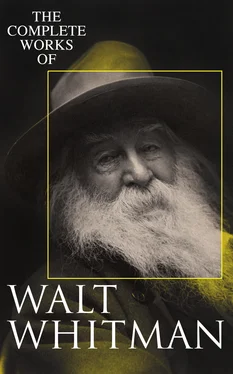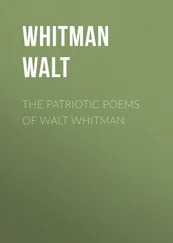Stands or is rising thy true monument.
Of That Blithe Throat of Thine
Table of Contents
Of that blithe throat of thine from arctic bleak and blank,
I’ll mind the lesson, solitary bird — let me too welcome chilling drifts,
E’en the profoundest chill, as now — a torpid pulse, a brain unnerv’d,
Old age land-lock’d within its winter bay — (cold, cold, O cold!)
These snowy hairs, my feeble arm, my frozen feet,
For them thy faith, thy rule I take, and grave it to the last;
Not summer’s zones alone — not chants of youth, or south’s warm tides alone,
But held by sluggish floes, pack’d in the northern ice, the cumulus
of years,
These with gay heart I also sing.
Table of Contents
What hurrying human tides, or day or night!
What passions, winnings, losses, ardors, swim thy waters!
What whirls of evil, bliss and sorrow, stem thee!
What curious questioning glances — glints of love!
Leer, envy, scorn, contempt, hope, aspiration!
Thou portal — thou arena — thou of the myriad long-drawn lines and groups!
(Could but thy flagstones, curbs, facades, tell their inimitable tales;
Thy windows rich, and huge hotels — thy side-walks wide;)
Thou of the endless sliding, mincing, shuffling feet!
Thou, like the parti-colored world itself — like infinite, teeming,
mocking life!
Thou visor’d, vast, unspeakable show and lesson!
To Get the Final Lilt of Songs
Table of Contents
To get the final lilt of songs,
To penetrate the inmost lore of poets — to know the mighty ones,
Job, Homer, Eschylus, Dante, Shakespere, Tennyson, Emerson;
To diagnose the shifting-delicate tints of love and pride and doubt —
to truly understand,
To encompass these, the last keen faculty and entrance-price,
Old age, and what it brings from all its past experiences.
Table of Contents
Far back, related on my mother’s side,
Old Salt Kossabone, I’ll tell you how he died:
(Had been a sailor all his life — was nearly 90 — lived with his
married grandchild, Jenny;
House on a hill, with view of bay at hand, and distant cape, and
stretch to open sea;)
The last of afternoons, the evening hours, for many a year his
regular custom,
In his great arm chair by the window seated,
(Sometimes, indeed, through half the day,)
Watching the coming, going of the vessels, he mutters to himself —
And now the close of all:
One struggling outbound brig, one day, baffled for long — cross-tides
and much wrong going,
At last at nightfall strikes the breeze aright, her whole luck veering,
And swiftly bending round the cape, the darkness proudly entering,
cleaving, as he watches,
“She’s free — she’s on her destination” — these the last words — when
Jenny came, he sat there dead,
Dutch Kossabone, Old Salt, related on my mother’s side, far back.
Table of Contents
As down the stage again,
With Spanish hat and plumes, and gait inimitable,
Back from the fading lessons of the past, I’d call, I’d tell and own,
How much from thee! the revelation of the singing voice from thee!
(So firm — so liquid-soft — again that tremulous, manly timbre!
The perfect singing voice — deepest of all to me the lesson — trial
and test of all:)
How through those strains distill’d — how the rapt ears, the soul of
me, absorbing
Fernando’s heart, Manrico’s passionate call, Ernani’s, sweet Gennaro’s,
I fold thenceforth, or seek to fold, within my chants transmuting,
Freedom’s and Love’s and Faith’s unloos’d cantabile,
(As perfume’s, color’s, sunlight’s correlation:)
From these, for these, with these, a hurried line, dead tenor,
A wafted autumn leaf, dropt in the closing grave, the shovel’d earth,
To memory of thee.
Table of Contents
Nothing is ever really lost, or can be lost,
No birth, identity, form — no object of the world.
Nor life, nor force, nor any visible thing;
Appearance must not foil, nor shifted sphere confuse thy brain.
Ample are time and space — ample the fields of Nature.
The body, sluggish, aged, cold — the embers left from earlier fires,
The light in the eye grown dim, shall duly flame again;
The sun now low in the west rises for mornings and for noons continual;
To frozen clods ever the spring’s invisible law returns,
With grass and flowers and summer fruits and corn.
Table of Contents
A song, a poem of itself — the word itself a dirge,
Amid the wilds, the rocks, the storm and wintry night,
To me such misty, strange tableaux the syllables calling up;
Yonnondio — I see, far in the west or north, a limitless ravine, with
plains and mountains dark,
I see swarms of stalwart chieftains, medicine-men, and warriors,
As flitting by like clouds of ghosts, they pass and are gone in the
twilight,
(Race of the woods, the landscapes free, and the falls!
No picture, poem, statement, passing them to the future:)
Yonnondio! Yonnondio! — unlimn’d they disappear;
To-day gives place, and fades — the cities, farms, factories fade;
A muffled sonorous sound, a wailing word is borne through the air
for a moment,
Then blank and gone and still, and utterly lost.
Table of Contents
Ever the undiscouraged, resolute, struggling soul of man;
(Have former armies fail’d? then we send fresh armies — and fresh again;)
Ever the grappled mystery of all earth’s ages old or new;
Ever the eager eyes, hurrahs, the welcome-clapping hands, the loud
applause;
Ever the soul dissatisfied, curious, unconvinced at last;
Struggling to-day the same — battling the same.
Table of Contents
My science-friend, my noblest woman-friend,
(Now buried in an English grave — and this a memory-leaf for her dear sake,)
Ended our talk — ”The sum, concluding all we know of old or modern
learning, intuitions deep,
“Of all Geologies — Histories — of all Astronomy — of Evolution,
Metaphysics all,
“Is, that we all are onward, onward, speeding slowly, surely bettering,
“Life, life an endless march, an endless army, (no halt, but it is
duly over,)
“The world, the race, the soul — in space and time the universes,
“All bound as is befitting each — all surely going somewhere.”
Small the Theme of My Chant
Table of Contents
Small the theme of my Chant, yet the greatest — namely, One’s-Self —
a simple, separate person. That, for the use of the New World, I sing.
Man’s physiology complete, from top to toe, I sing. Not physiognomy alone,
nor brain alone, is worthy for the Muse; — I say the Form complete
is worthier far. The Female equally with the Male, I sing.
Nor cease at the theme of One’s-Self. I speak the word of the
modern, the word En-Masse.
My Days I sing, and the Lands — with interstice I knew of hapless War.
(O friend, whoe’er you are, at last arriving hither to commence, I
feel through every leaf the pressure of your hand, which I return.
And thus upon our journey, footing the road, and more than once, and
Читать дальше












